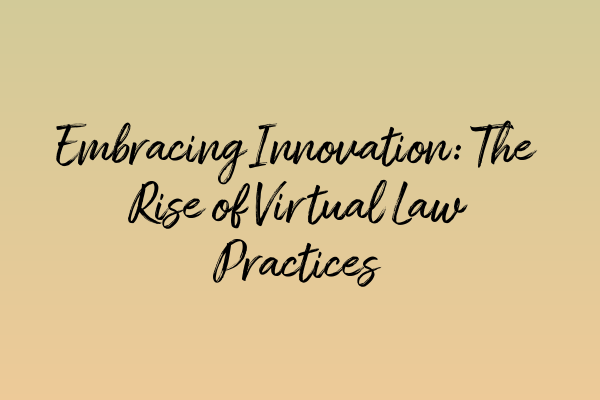Embracing Innovation: The Rise of Virtual Law Practices
In the ever-evolving digital age, it’s no surprise that the legal profession is also undergoing a significant transformation. Traditional brick-and-mortar law firms are no longer the only option for clients seeking legal services. The rise of virtual law practices is revolutionizing the legal landscape, providing more accessible, efficient, and cost-effective solutions for clients and practitioners alike.
What are Virtual Law Practices?
Virtual law practices, also known as online or remote law practices, are law firms that primarily operate through digital platforms. These firms leverage technology and innovative tools to deliver legal services to clients without the need for physical office spaces. Instead, they rely on secure online portals and communication channels to interact with clients, manage cases, and provide legal advice.
By embracing the virtual model, these law practices are able to eliminate the geographical limitations and overhead costs associated with traditional firms. This allows them to streamline their operations, offer competitive pricing, and provide flexible services tailored to the needs of their clients.
The Advantages of Virtual Law Practices
The rise of virtual law practices has brought numerous benefits to both clients and legal professionals:
- Accessibility: Virtual law practices break down geographical barriers, allowing clients to access legal expertise regardless of their location. Clients no longer need to travel to physical law offices, saving time and expenses.
- Cost-Effectiveness: By eliminating the need for physical office spaces and reducing overhead costs, virtual law practices can offer more affordable legal services. This makes legal representation more accessible to a wider range of clients.
- Flexibility: Virtual law practices offer greater flexibility for both clients and practitioners. They can schedule consultations and meetings at mutually convenient times, allowing for increased convenience and work-life balance.
- Efficiency: Leveraging technology and digital tools, virtual law practices streamline their processes, resulting in increased efficiency. Online document management, e-signatures, and video conferencing enable seamless collaboration and communication between clients and lawyers.
It’s important to note that while virtual law practices offer tremendous advantages, they may not be suitable for all types of legal matters. Complex litigation or cases requiring significant in-person interaction may still benefit from traditional law firm representation. However, for many routine legal services and consultations, virtual law practices provide a viable and efficient alternative.
The Future of the Legal Profession
As technology continues to advance, virtual law practices are expected to become even more prevalent in the legal industry. Clients are increasingly embracing the convenience and benefits of online legal services, while legal professionals are recognizing the potential for greater flexibility and efficiency.
Legal regulators and governing bodies are also adapting to this changing landscape. The Solicitors Regulation Authority (SRA) recently introduced new rules and guidelines to accommodate virtual law practices, ensuring that they operate within the boundaries of professional standards and ethical obligations.
By embracing innovation and adopting virtual law practices, legal professionals can expand their client base, improve accessibility, and increase efficiency. It’s a win-win situation for both clients and practitioners.
Conclusion
The rise of virtual law practices represents a significant shift in the legal profession. As more clients seek accessible and cost-effective legal services, virtual law practices are stepping up to fulfill those needs. By leveraging technology and embracing innovation, these practices are revolutionizing the way legal services are delivered.
Do you want to learn more about criminal law? Check out these related articles:
- Private Prosecutions: Exploring Non-Governmental Prosecutions in Criminal Cases
- Rights of the Accused: Protecting Individual Liberties in Criminal Proceedings
- Magistrates’ Court vs Crown Court: Understanding Key Differences
- Protecting Vulnerable Witnesses in Criminal Trials: Best Practices and Legal Safeguards
- Unraveling the Complexities of UK Bail Laws


Leave a Reply